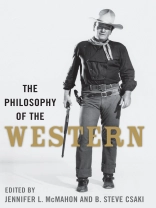The western is arguably the most iconic and influential genre in American cinema. The solitude of the lone rider, the loyalty of his horse, and the unspoken code of the West render the genre popular yet lead it to offer a view of America’s history that is sometimes inaccurate. For many, the western embodies America and its values. In recent years, scholars had declared the western genre dead, but a steady resurgence of western themes in literature, film, and television has reestablished the genre as one of the most important. In The Philosophy of the Western, editors Jennifer L. Mc Mahon and B. Steve Csaki examine philosophical themes in the western genre. Investigating subjects of nature, ethics, identity, gender, environmentalism, and animal rights, the essays draw from a wide range of westerns including the recent popular and critical successes Unforgiven (1992), All the Pretty Horses (2000), 3:10 to Yuma (2007), and No Country for Old Men (2007), as well as literature and television serials such as Deadwood. The Philosophy of the Western reveals the influence of the western on the American psyche, filling a void in the current scholarship of the genre.
قائمة المحتويات
Introduction
Do Not Forsake Me My Darling: Loneliness and Solitude in Westerns
Civilization and its Discontents: The Self-Sufficient Western Hero
Mommas Don’t Let Your Babies Grow Up to be Pragmatists
Two Ways to Yuma: Locke, Liberalism, and Western Masculinity in 3:10 to Yuma
Landscapes of Gendered Violence: Male Love and Anxiety on the Railroad
Order Out of the Mud: Deadwood and the State of Nature
Order Without Law: The Magnificent Seven, East and West
From Dollars to Iron: The Currency of Clint Eastwood’s Westerns
The Duty of Reason: Kantian Ethics in High Noon
The Cost of the Code: Ethical Consequences in High Noon and The Ox-Bow Incident
Back Off to What? The Search for Meaning in The Wild Bunch
No Country for Old Men: The Decline of Ethics and the West (ern)
The North-Western: Mc Cabe and Mrs. Miller
Savage Nations: Native Americans and the American Western
Regeneration through Stories and Song: The View from the Other Side of the West in Smoke Signals
Go West, Young Woman! Hegel’s Dialectic and Women’s Identities in Western Films
Beating a Live Horse: The Elevation and Degradation of the Horse in Westerns
عن المؤلف
B. Steve Csaki was most recently a visiting professor at Centre College, where he taughtcourses in philosophy, the humanities, and Japanese. He lives in Stratford, Oklahoma.












